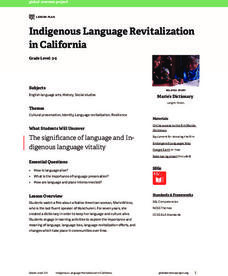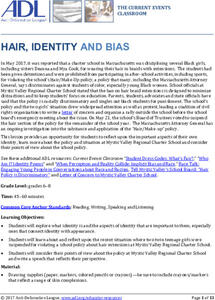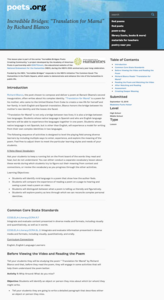K20 LEARN
Taking a Bite! Exploring Cultural Identity Through Food
High schoolers are asked to consider the connections between food, culture, and identity. They read articles and share what they learned in a jigsaw activity, read a short story, and make a claim about the story's theme, backing up their...
Global Oneness Project
Indigenous Language Revitalization in California
A film showcases a Native American woman and her hard work to create a dictionary detailing her tribe's language. While viewing, scholars reflect upon and discuss the importance of language and sustaining cultural identity.
Global Oneness Project
The Importance of Indigenous Language Revitalization
Middle schoolers consider languages as representations of cultures and the importance of preserving various languages, especially the rapidly disappearing languages of indigenous peoples, in a lesson that tells the story of Marie Wilcox...
Global Oneness Project
The Value of Sports: Unifying a Community
The Global Oneness Project presents a lesson about the power of sport to bring a community together. After watching the documentary film, I am Yup'ik, class members use the provided discussion questions to reflect on the importance of...
Global Oneness Project
Cultural Heritage: Recording a Native Language Dictionary
How do you rebuild a language that has been banned for years? A short video introduces high schoolers to Marie Wilcox, A Wukchumni Native American from Central California who, for over 20 years, worked on comprising a dictionary of the...
K20 LEARN
Where I'm From: Poetry
We carry memories of where we're from; tweens and teens can capture these memories by first listening to several memory poems and then crafting their own. They analyze literary devices other poets use, brainstorm a list of images they...
Anti-Defamation League
Viewing History from Multiple Perspectives
Celebration or protest song? The full text of Woody Guthrie's "This Land is Your Land" opens a study of the Lewis and Clark Expedition, the Louisiana Purchase, and Western Expansion from various perspectives. Middle schoolers examine...
Anti-Defamation League
Should Washington's NFL Team Change Their Name?
"What's in a name?" Is it irrelevant, as Juliet suggests in Shakespeare's play, or is nomenclature deeply significant? Young scholars weigh in on the debate by examining the controversy over the NFL's Washington, D.C. Redskins. Groups...
Core Knowledge Foundation
Unit 1: Hello, Universe by Erin Entrada Kelly Teacher Guide
Erin Entrada Kelly's award-winning novel, Hello, Universe is the anchor text in this 236-page teacher guide. The guide includes introductions to the Core Knowledge Language Arts (CKLA) program and the unit, a unit calendar, 12 lessons...
Anti-Defamation League
Don't Let Hate Ruin the Fun: Youth and Online Games
Gamers unite! Take action against bullying and hate speech in online video games! After reading data that reveals the extent to which various age groups experience hate and, or harassment while playing video games online, groups develop...
Anti-Defamation League
Hair, Identity and Bias
Middle schoolers weigh in on dress codes, specifically those that apply to hair and make-up, with a lesson plan that uses a 2017 case from a charter school in Massachusetts. Class members read about two girls suspended for violating the...
Academy of American Poets
Incredible Bridges: “Translation for Mamá” by Richard Blanco
Who or what do you miss? That's the question that launches an activity that asks writers to craft a paragraph filled with sensory details that shows how they feel. Next, they listen to Richard Blanco reading his poem, "Translation for...
Anti-Defamation League
Understanding and Analyzing “The U.S. of Us” by Richard Blanco
Current immigration issues and the rhetoric surrounding the controversies come into focus with a lesson that uses Richard Blanco's anthem, "The U.S. of Us," written after the August 2019 attack in El Paso, Texas, to open a discussion of...
Overcoming Obstacles
Presenting Yourself
"Presenting Yourself," the last lesson in the "Looking to the Future" module, asks participants to review and reflect on what they have learned about themselves in the Overcoming Obstacles course. They review their course folder and...
Facing History and Ourselves
Our Names and Our Place in the World
Names come with all sorts of nuances and can influence how we see ourselves and how others see us. To gain insight into the power of names, class members journal about their names and then read a short essay about a girl and her feelings...
Facing History and Ourselves
Dual Identities
Many of us have multiple identities. There's who we are at home, school, friends, and strangers. And often these identities come with different names. The third activity in the First Days of School series examines how names reflect...
Facing History and Ourselves
What's In a Name?
Rumpelstiltskin understood the power of names. The second lesson in the First Days of School series focuses on building community by recognizing the importance of the relationships among names, identities, and cultures. Learners engage...
Overcoming Obstacles
Who Are You?
Personal involvement in any class is essential! That's the takeaway from the first activity in the Getting Started module. Class members participate in games to learn each other's names and details. The goal is to create an atmosphere...
Facing History and Ourselves
Identity Charts
Many factors shape the identity of persons, communities, and even nations. Tweens and teens have an opportunity to consider the many aspects of identity as they create a graphic that reflects who they are. Class members first brainstorm...
Facing History and Ourselves
Bio-poem: Connecting Identity and Poetry
Writing a bio-poem is a great way to have young scholars go below the surface and reflect on who or what has made them who they are. Check out this richly detailed lesson that provides step-by-step directions for crafting a bio-poem.
PBS
Exploring Identity and Intersectionality in Poetry
Just as Kermit the Frog notes, "It isn't easy being green!" it isn't easy occupying "multiple Identity spaces." Class members read and discuss poems by writers detailing what it is like when their identities are "oppressed."
TeenMentalHealth
Know Before You Go Teacher’s Guide
A 124-page guide provides instructors with what they need to know before launching a seven-lesson thematic unit designed for high school seniors on issues they will face after graduation. Topics covered include mental health and...
Facing History and Ourselves
Many Voices, One National Identity
To conclude the unit on "Exploring Identity in the United States," pupils consider whether it is possible to combine many voices into one national identity. After creating an identity chart that lists words, phrases, and images that they...
Facing History and Ourselves
Connecting to the Past
Young historians research the connections between their personal histories and the histories of our country to gain a deeper understanding of who they are. To begin, class members write about an object that they consider significant to...

























